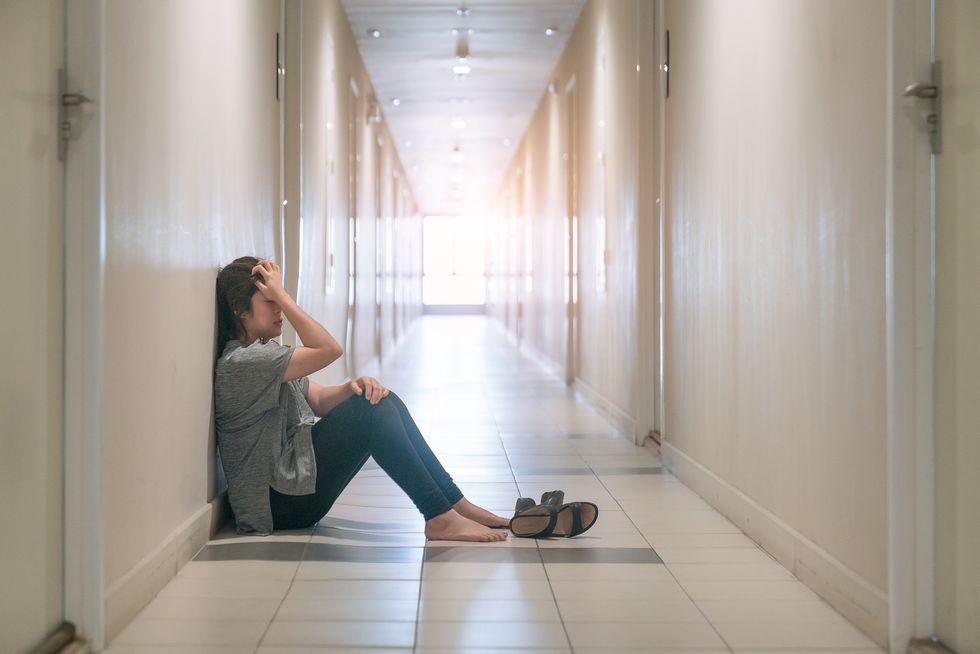Conversation around the mental health crisis in the UK is characterised by one, pervasive common enemy. And that enemy is: stigma.
This year, Ford launched a campaign collaborating with Time to Change, encouraging people to push past stigma to 'break the silence' about mental health. A similar initiative was spearheaded by the Royal Family in 2017, The Heads Together campaign, 'raising awareness and tackling stigma.' The message here is clear: stigma must be 'tackled', 'banished', 'battled' and 'pushed past' once and for all.
It is stigma and its bedmates shame and fear, we are told, that remain the barriers to individuals getting treatment for mental health problems.
But whilst in part true, putting it at the crux of the mental health crisis detracts from more pressing issues.
Is 'stigma' really the issue?
Clinging to a more digestible explanation of the issue avoids the more difficult truth: that in 2019, even if you recognise and seek help for your mental health problems, you may not receive it.
A battle against the true enemy - government cuts - makes us feel more helpless, so stigma remains the mask before the big Scooby Doo-style reveal of the true culprit - austerity and NHS defunding.
'Awareness' is actually at an all time high, but yet mental health is at an all time low. In the stigma-free utopia we are running toward with arms outstretched - a place in which we have sloganed away all discomfort and found ourselves on the other side of shame - what are we actually likely to find?
A broken, unworkable system, that is not equipped to deal with those who need it most.
Those that are not on the most extreme sides of the mental health spectrum fall through the cracks
I know this, because so many people that I care about have fought their way through every single hurdle caused by stigma, but were met with no real help on the other side.
A close friend of mine had been struggling with their mental health for years and as a black, working class man, didn't think he'd be a shoe-in to receive therapy, which prevented him from seeking any. But after bouts of self-harming and several failed suicide attempts, it became clear to him that his scepticism about therapy was literally the difference between life and death.
After one particularly close call, which landed him in hospital, he took the plunge and begrudgingly asked the medical staff there for help. He was discharged after one day (as he was after every following attempt on his life), because he wasn't deemed a danger to anyone; not even himself.
He would try to take his life at least twice more after this and have the police called to his home and workplace almost weekly - none of which seemed to be enough to secure him any therapeutic help. The fact that his self harm scars were continually mistaken for tribal marks by professionals didn’t help matters much either. Eventually, he was placed in a recovery house for six weeks. After he was discharged, he explained to me that he remained on a waiting list for counselling for over three months.
Another loved one of mine is quadriplegic. She experienced serious psychological trauma, as well as physical, when she suffered a life-altering injury.
She feels that she has never been prioritised in the system because, due to her injury, she cannot be of physical harm to herself or to anyone else. In the rare instance that mental health services got in touch, she said she was offered catch-all questionnaires that weren’t relevant to her situation. They would ask, for instance, if she felt 'able to get herself ready in the mornings,' something she is unable to do regardless of her mood.
A while back, I too sought some counselling, but as a low risk patient, I was offered an insomnia workshop in Kent, a near two hour train ride from my home in Croydon. Compared to the droves turned away entirely, I guess I was lucky.
By the NHS's own admission, one in five women are now reporting a common mental disorder, but only one in three of these people are accessing mental health treatment. And of those 'treatments,' prescription medication is the most common, with only three per cent of people reporting receiving any psychological therapy.
The problem is clear - cries for help aren't often being met with reasonable resources.
The cases I have mentioned are all within the groups most resistant to seeking out mental health services statistically; groups in which 'stigma' is most strong - ethnic minorities from working class backgrounds. And yet, when push came to shove, they attempted to engage and were failed.
Unless you’re on one or other end of a pretty extreme spectrum, help doesn't seem readily available to those requesting it from the U.K.'s health service. If you're suffering from serious psychosis and pose a real threat to your own or someone else's life, you might get an audience with a therapist and if you've some minor anxiety that might be cured by a six-session CBT over the phone, then you might get that and nothing more.
It appears that anyone else falls between the cracks.
'Stigma' is detracting from the real issue: austerity
With even the most image conscious celebrities now speaking frankly about depression, silence isn’t the most pressing issue any more.
Talk of stigma doesn’t need to be retired, but it currently it serves to deflect energy away from the real problem, which is the desecration of the NHS. The GPs, nurses and other health care practitioners tasked with spotting and treating mental health issues are not to blame - the government's reduction of the NHS' resources, on the other hand, has a lot to answer for.
Despite one in four people being affected by mental illness in the UK, spending on mental health services amounts to only 11% of the NHS budget.
Just last year, the Norfolk and Suffolk NHS foundation was rated inadequate for a third time and The Care Quality Commission found 'significant concerns' during its inspection, including patients harming themselves and taking overdoses while waiting to be seen. Yet, despite growing calls for Health Secretary Matt Hancock’s input, he is yet to intervene.
Social media, like stigma, is often scapegoated as the lead cause of the decline in mental health in young people. But a parliamentary committee just last year unveiled the real culprit - austerity.
The government cuts have affected more than just the NHS' ability to offer psychological care. Cuts elsewhere are also having a detrimental affect on our overall mental health. 'We’ve lost things in the school system, things that we know have a therapeutic value,' mental health campaigner Natasha Devon told the House of Commons. 'In the state sector, things like art, music, drama and sport have been systematically squeezed out.'
The impact of austerity has also served to deepen already prevalent inequalities. As outlined in Iain David Cummins' essay The Impact Of Austerity On Mental Health Service Provision, 'the impact of austerity [has] a disproportionate impact on the most vulnerable... Welfare services, which [are] targeted, are designed to support those facing the most difficult situations. Any reduction in services will have its greatest impact on the poor and vulnerable.' And of course, 'the experience of ongoing acute stress [such as that associated with debt, poor housing and lack of resources] can have detrimental impact on an individual’s mental health.'
Unsurprisingly, the buck has fallen to local communities to pick up the slack. My friend turned to an independently run, word of mouth group therapy session for black men specifically. Support groups have their own stigma, as they are often associated with addiction and anger management, but are similar to group therapy and increasingly turned to as a low-cost or free option. More and more therapists are offering counselling on a sliding scale basis, meaning they offer services based on how much you make, the severity of your situation and other factors. Many even provide their private services free of charge.
Another medium being utilised is therapists in training - in the same way that trainee hairdressers offer cut-price or free haircuts for on-the-job experience, psychologists provide similar sessions supervised by someone who is licensed. Many others turn to free services provided by their place of worship. And whilst no replacement for professional mental healthcare, mental health apps are on the rise, equipping users with useful coping mechanisms and a brief relief from symptoms.
The problem, of course, is that these should be supplementary to our health care system and yet they are becoming a lifeline to many who feel they have no alternative.
As we talk about mental health more than ever, more mental health services are being being closed down and waiting lists are only getting longer. In order for the change we incessantly speak of to occur, we have to act in a meaningful way to bolster the country's resources for mental health treatment - and fast.

















